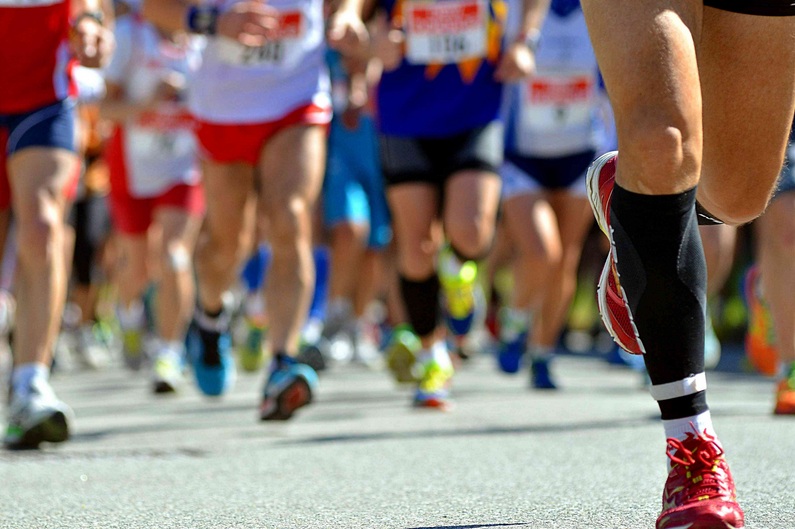Half marathons have become renowned among many aspiring runners since they require significantly less time and effort than full marathons.
Moreover, it is ideal for persons who cannot do a full marathon and for athletes who are new to the sport.
Even with the basic marathon plans currently popular, athletes must still work up with long preparation sessions of at least 20 miles before attempting the 26.2-mile marathon course on race day.
Among many countries, the United Kingdom is one of those that embraces and enjoys half marathons. Let's unravel deeper into what a half marathon is and the truths about it.
What Is A Half Marathon?
A half marathon is a 21.0975-kilometre road marathon race that is half the length of a marathon. It is usual for half marathons to be staged alongside a marathon or a 5K sprint, utilising almost the same circuit but with a later start, an earlier completion, or cutbacks.
If finisher medals are given out, the award or ribbons may differ from those given out for the full marathon.
You can also call a half marathon a 21K, 21.1K, or 13.1-mile run; however, these amounts are approximated and are not officially valid.
Prevent These 4 Marathon Training Errors
1. Failure To Comply With A Training Plan
Many marathon training programmes will be centred purely on running and distance when determining how to prepare for a marathon.
Warm-ups, cool-downs, strength exercises, and mobility work are essential components of a marathon training plan to help avoid common running injuries.
Even if you are not preparing for a full marathon and are following a half marathon training schedule, these factors are essential for increasing speed and decreasing the probability of injury.
2. Ignoring That Obvious Pain
Are you experiencing a strange discomfort which you’re simply wishing to go away? You may think that it’s okay since it disappears for a while during sessions, but the thing is, you need to do something about it.
Avoiding the pain from the start is merely creating negative habits, but more crucially, avoiding the discomfort for too long results in a far longer healing process than you would have required in the first place.
Furthermore, if the pain you ignored for too long comes back stronger during race day, it may be pretty problematic for you.
3. FOMO Or Fear Of Missing Out
Many of you have been exposed to "Strava stalking," which includes looking at another person's mileage and attempting to incorporate it into marathon preparation. This might cause major FOMO (fear of missing out), although you have to follow your marathon training schedule at the end of the day.
However, if you need to reduce your distance due to an injury or soreness someplace, that's okay.
Remember, we're looking for the best amount of miles for you. Also, keep in mind that recovery is just as vital as the lengthy run.
Whether you're wounded or not, you should constantly make sure that you're exerting yourself hard sufficiently but not over-exerting yourself.
4. Data-less Training
It's lovely to be in sync with your physique and run entirely on instinct. However, when it comes to racing a marathon, data can only assist you in improving your life. To begin, we'd want to have a good idea of when we'll be finished. Run a half marathon 6-8 weeks before your event to do this. This will give you the most trustworthy data for calculating your race-day goals.
Half Marathons In UK
Half marathons are among the most well-known track competitions in the United Kingdom. A half marathon is a 13.1-mile running race generally held on roads rather than terrain (21.1km).
Every year, around 500 half-marathons are organised in the United Kingdom, such as the Great North Run that draws over 57,000 participants. If you are determined to participate in half-marathons many event organisers for UK marathons online are available.
Facts And Trivia
- A half marathon is 21.1 kilometres long or equal to half the marathon distance.
- Geoffrey Kamworor of Kenya has the male's half marathon world record of 58:01 mins, and Joyciline Jepkosgei of Kenya holds the female's record of 64:51 mins.
- Both male's and female's half-marathon record-holders were recorded in the Valencia Half Marathon in Spain.
- Over the previous few years, the average half marathon pace for males has been around 1h54m and 2h10m for females.
- A rookie sprinter needs at least 12 weeks to prepare for a half marathon, an experienced athlete needs 8 weeks, and a proficient racer who is already in the habit needs as little as 6 weeks.
Conclusion
Runners who exercise regularly sometimes become accustomed to a specific route and speed. This does not help runners develop; in fact, maintaining the same behaviours typically hinders progress.
Sometimes, you'll be exercising at a marathon pace, raising your heart rhythm for brief periods, and conditioning your legs to spin over swiftly.
On other days, when you're healing, encourage yourself to run at quite a slower speed like in a half marathon than in your full marathon pace so that your body can adequately recuperate.
These tactics will be far more beneficial than merely running at about the same middle-of-the-road speed every day. Finally, use that data to aid in your recovery.
The figures will tell you how tough you've been training and encourage you to include a rest day. If you want to go more detailed, you can use the data to track your resting heart rate to determine how well your body reacts to your marathon training.


Post a Comment